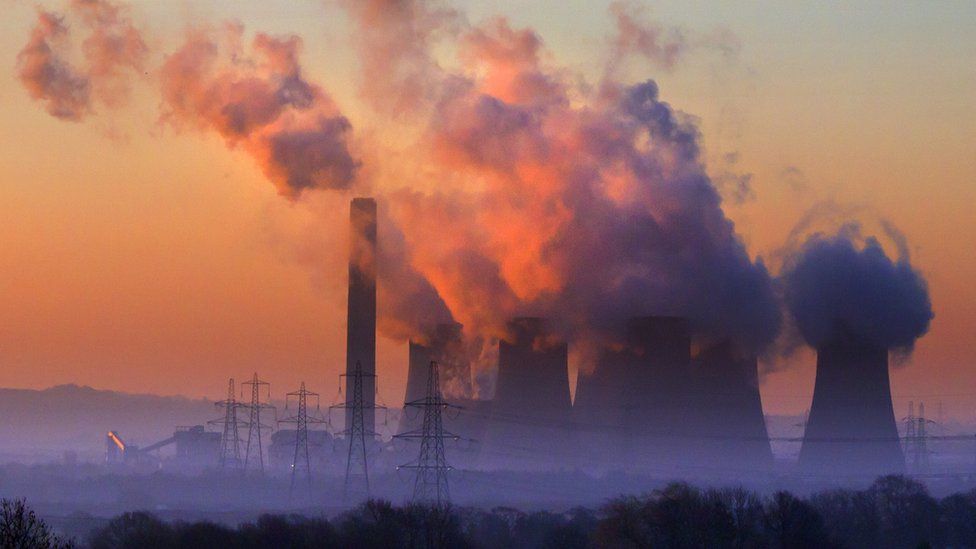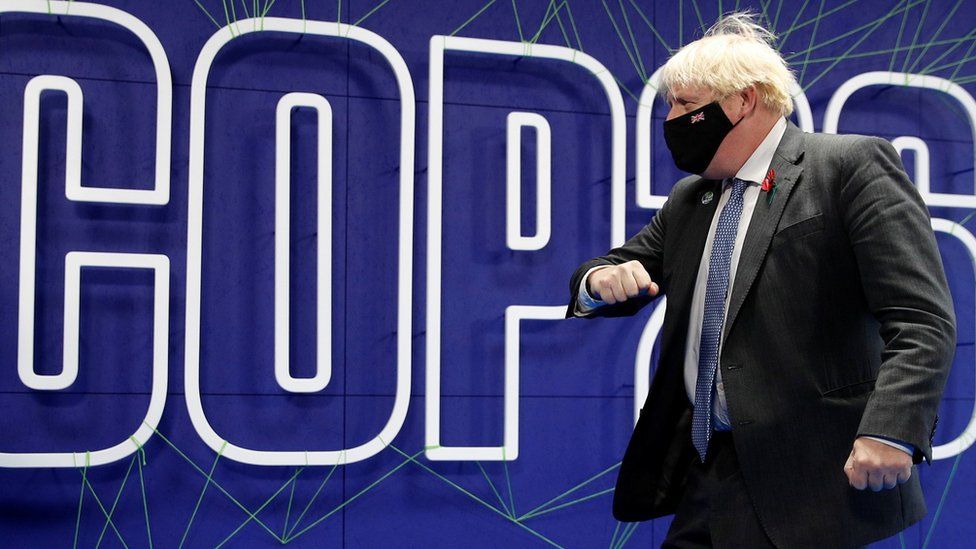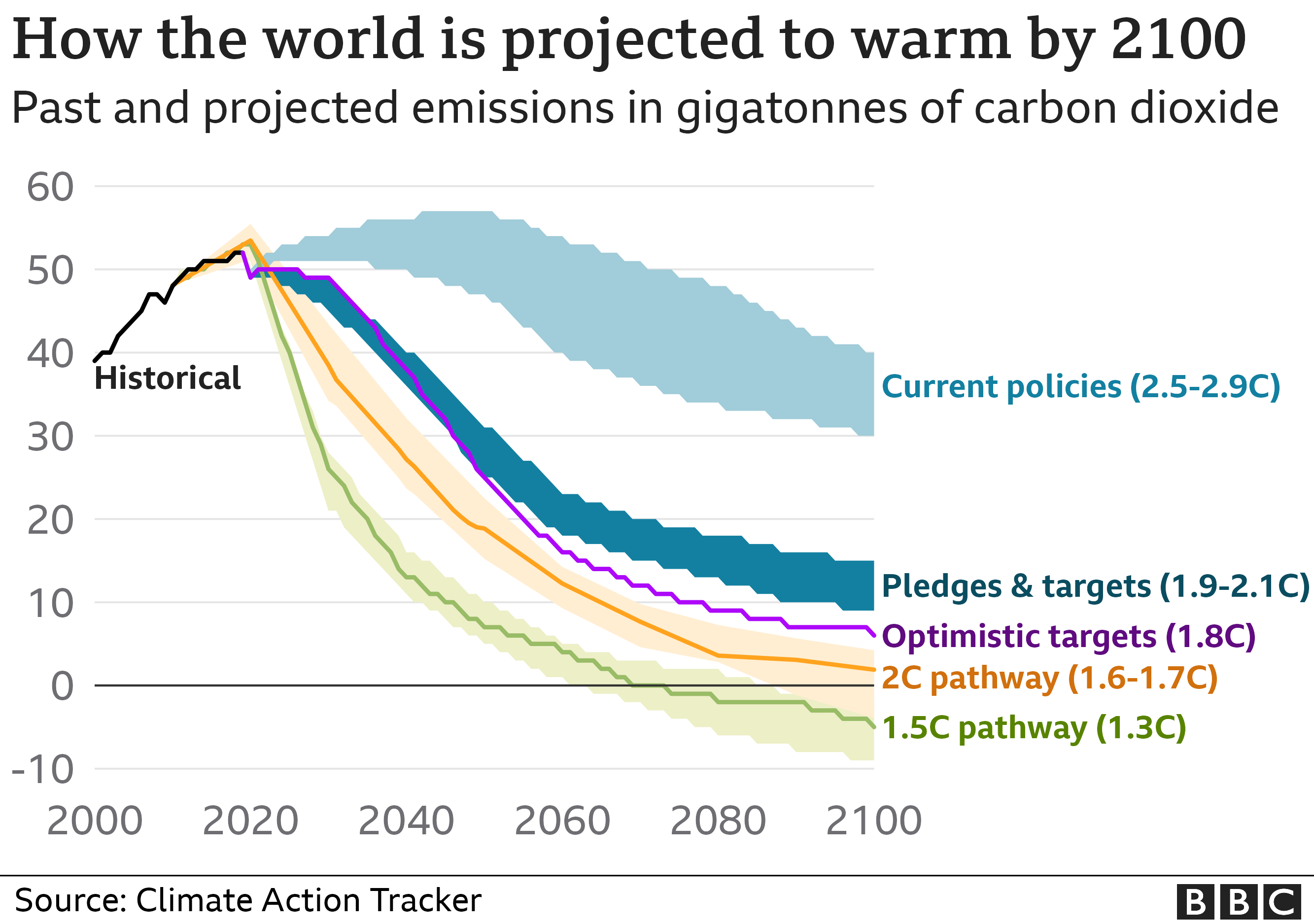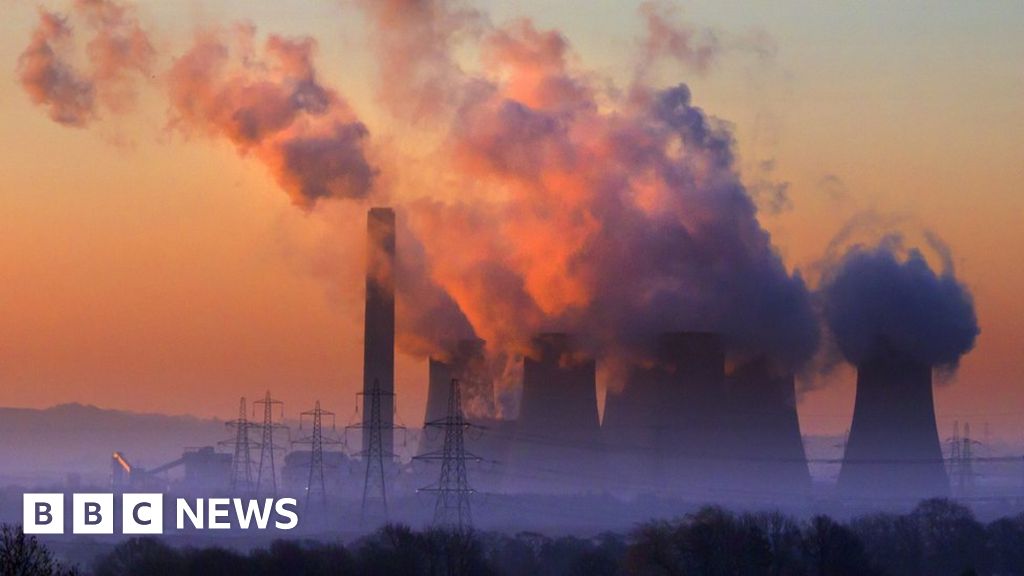
Countries are being urged to strengthen their carbon-cutting targets by the end of 2022 in a draft agreement published at the COP26 Glasgow climate summit.
The document says vulnerable nations must get more help to cope with the deadly impacts of global warming.
It also says countries should submit long-term strategies for reaching net-zero by the end of next year.
Critics have said the draft pact does not go far enough but others welcomed its focus on the 1.5C target.
The document, which has been published by the UK COP26 presidency, will have to be negotiated and agreed by countries attending the talks.
Scientists have warned that keeping temperature rises to 1.5C – beyond which the worst impacts of climate change will be felt – requires global emissions to be cut by 45% by 2030 and to zero overall by mid-century.
With the world off track to meet the goal, the draft document urges countries to “revisit and strengthen” the targets for cutting emissions by 2030 in their national plans to align them with the Paris Agreement goal of well below 2C or 1.5C by the end of 2022.
Loss and damage – an issue of key importance to the developing world – has been included in the draft, calling for more support from developed countries and other organisations to address the damage caused by extreme weather and rising seas in vulnerable nations.
It also recognises that more finance is needed for developing countries beyond the long-promised $100bn a year by 2020, which will not be delivered until at least 2022.
But campaigners said these parts of the text were weak and were essentially a “box ticking exercise”.
The document also calls on countries to accelerate the phasing out of coal and subsidies for fossil fuels – but has no firm dates or targets on this issue.
It also asks UN secretary general Antonio Guterres to convene world leaders in 2023 to consider how efforts to reach targets for 2030 are shaping up.

‘One hell of a fight’ ahead on draft

Some 200 countries are meeting at COP to try to keep the lid on rising temperatures. Today, a document that forms the basis of what they could sign up to in Glasgow has been released by the hosts of the conference, the UK presidency.
It sums up everything that has been discussed so far, but is very much a draft.
There are bits missing and a number of contentious issues, which could get strengthened or watered down over the next few days.
The reference to phasing out fossil fuels will undoubtedly be opposed by some nations.
And countries vulnerable to the most destructive effects of climate change will want assurances that more money is coming their way to help protect their people against rising sea levels, drought and storms.
At COP26 nothing is agreed until everything is agreed and getting a consensus among so many countries is never easy.
COP veterans expect “one hell of a fight” ahead – with all to play for in the next few days.

The World Wide Fund for Nature said the call for enhanced 2030 targets and references to phasing out fossil fuel subsidies, among other proposals, “must stick”.
Manuel Pulgar-Vidal, WWF Global Lead Climate & Energy said: “With the world still on course for dangerous global warming, it is essential that ministers work to include a clear plan to close the 2030 ambition gap and the timeframe to do this.
“It is clear that there is more to be done, and negotiators must improve the areas of the text that are still weak. This must be a floor, not a ceiling.”
David Waskow, from the World Resources Institute, said there would be opposition to the idea of coming back with new plans next year from a range of countries.
“On the question of the revisiting and strengthening of targets, there are certainly parties who have been pushing back, the Saudis and Russians have been quite clear on that, others have been less blunt,” he said.
“The other countries who are pushing back are many of the vulnerable countries, who don’t comprise that large percentage of global emissions often or have very limited resources to develop nationally-determined contributions and then to implement them.”
The Alliance of Small Island States, whose members are among the nations least responsible for climate change, said the text needed to be strengthened in “key areas” to respond to the needs of the most vulnerable countries, particularly on finance.

Jennifer Morgan from Greenpeace International said: “This draft deal is not a plan to solve the climate crisis, it’s an agreement that we’ll all cross our fingers and hope for the best.”
Labour’s shadow business secretary Ed Miliband said Prime Minister Boris Johnson needed to “take charge of a summit that is not on track to deliver”.
“We are miles off where we need to be in the halving of emissions required by 2030,” he said.
“It’s time the government faced this truth, stopped the greenwash, and put maximum pressure on all parties to step up and agree a path out of Glasgow to keep 1.5 alive.”

The prime minister has returned to COP26.
Earlier on Wednesday, he spoke with the crown prince of Saudi Arabia about the country’s climate pledges and the need to make “progress in negotiations” taking place in Glasgow, No 10 said.
Saudi Arabia was among a number of countries asking the UN to play down the need to move rapidly away from fossil fuels, according to leaked documents.
A Downing Street spokesman said: “They discussed the importance of making progress in negotiations in the final days of COP26, including on finalising the outstanding elements of the Paris rulebook.
“The prime minister said all countries needed to come to the table with increased ambition if we are to keep the target of limiting global warming to 1.5C alive.”
Research published at the summit on Tuesday indicated the short-term plans put in place by countries would see a rise of 2.4C.
While about 140 nations have pledged to reach net zero emissions by around the middle of the century, scientists have said their short-term plans for 2030 are not strong enough to limit the rise in temperatures.


